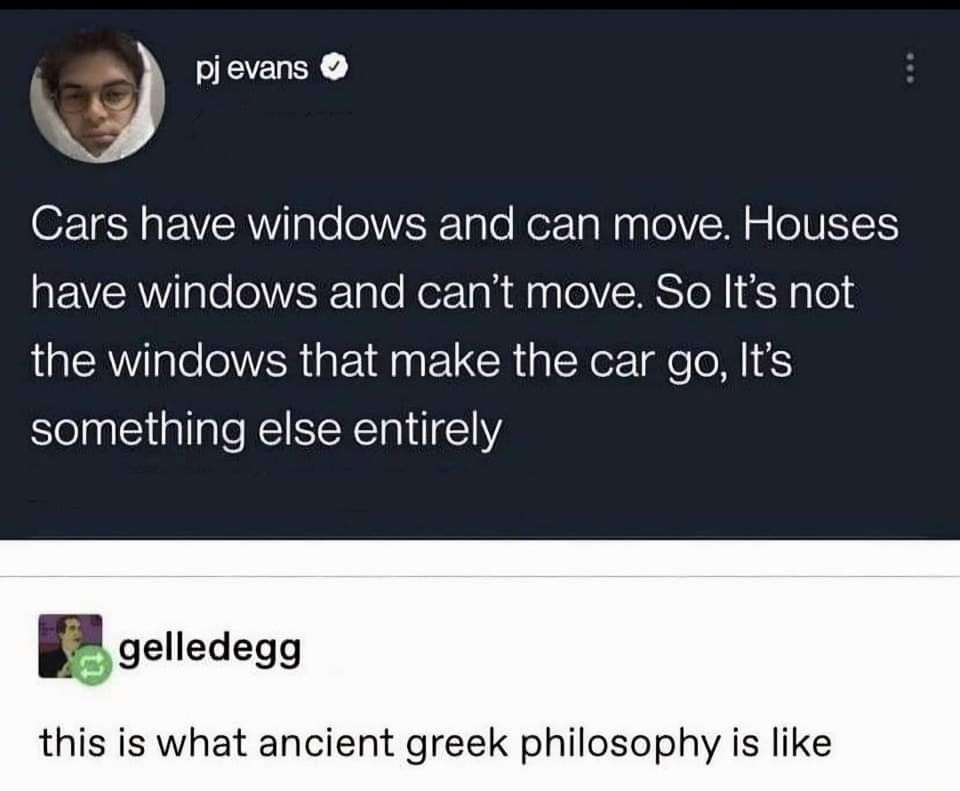this post was submitted on 25 Aug 2024
1483 points (98.9% liked)
memes
9646 readers
2316 users here now
Community rules
1. Be civil
No trolling, bigotry or other insulting / annoying behaviour
2. No politics
This is non-politics community. For political memes please go to [email protected]
3. No recent reposts
Check for reposts when posting a meme, you can only repost after 1 month
4. No bots
No bots without the express approval of the mods or the admins
5. No Spam/Ads
No advertisements or spam. This is an instance rule and the only way to live.
Sister communities
- [email protected] : Star Trek memes, chat and shitposts
- [email protected] : Lemmy Shitposts, anything and everything goes.
- [email protected] : Linux themed memes
- [email protected] : for those who love comic stories.
founded 1 year ago
MODERATORS
you are viewing a single comment's thread
view the rest of the comments
view the rest of the comments

I think it's kind of hilarious some of the insanely close conclusions some ancient philosophers got to being correct.
For example, Xenophanes observed that there were fossils of fish and shells, and correctly concluded that Greece was at one point underwater. He also had a bunch of insane claims on top of that, but the underwater part was correct.
His teacher, Anaximander actually said humans came from fish, which is hilariously close to correct despite the incorrect reasoning.
Empedocles is probably the most interesting. He concluded that humans and animals originated from these disembodied organs, which found each other and would form wholes. The catch was that many weird forms came about, like people with heads in the center of their bodies, and any other creation you can think of from just slapping animal organs together. He asserted that the forms which were unfit for life died out, leaving only the ones which worked to continue living. Empedocles almost describes a concept adjacent to multicellular organisms forming from single-celled symbiotic relationships (obviously Empedocles didn't know about bacteria or cell theory), and then goes on to pretty accurately describe the mechanisms of natural selection.
Lucretius in De Rerum Natura in 50 BCE seemed to have a few that were just a bit ahead of everyone else, owed to the Greek philosopher Epicurus.
Survival of the fittest (book 5):
"In the beginning, there were many freaks. Earth undertook Experiments - bizarrely put together, weird of look Hermaphrodites, partaking of both sexes, but neither; some Bereft of feet, or orphaned of their hands, and others dumb, Being devoid of mouth; and others yet, with no eyes, blind. Some had their limbs stuck to the body, tightly in a bind, And couldn't do anything, or move, and so could not evade Harm, or forage for bare necessities. And the Earth made Other kinds of monsters too, but in vain, since with each, Nature frowned upon their growth; they were not able to reach The flowering of adulthood, nor find food on which to feed, Nor be joined in the act of Venus.
For all creatures need Many different things, we realize, to multiply And to forge out the links of generations: a supply Of food, first, and a means for the engendering seed to flow Throughout the body and out of the lax limbs; and also so The female and the male can mate, a means they can employ In order to impart and to receive their mutual joy.
Then, many kinds of creatures must have vanished with no trace Because they could not reproduce or hammer out their race. For any beast you look upon that drinks life-giving air, Has either wits, or bravery, or fleetness of foot to spare, Ensuring its survival from its genesis to now."
Trait inheritance from both parents that could skip generations (book 4):
"Sometimes children take after their grandparents instead, Or great-grandparents, bringing back the features of the dead. This is since parents carry elemental seeds inside – Many and various, mingled many ways – their bodies hide Seeds that are handed, parent to child, all down the family tree. Venus draws features from these out of her shifting lottery – Bringing back an ancestor’s look or voice or hair. Indeed These characteristics are just as much the result of certain seed As are our faces, limbs and bodies. Females can arise From the paternal seed, just as the male offspring, likewise, Can be created from the mother’s flesh. For to comprise A child requires a doubled seed – from father and from mother. And if the child resembles one more closely than the other, That parent gave the greater share – which you can plainly see Whichever gender – male or female – that the child may be."
Objects of different weights will fall at the same rate in a vacuum (book 2):
“Whatever falls through water or thin air, the rate Of speed at which it falls must be related to its weight, Because the substance of water and the nature of thin air Do not resist all objects equally, but give way faster To heavier objects, overcome, while on the other hand Empty void cannot at any part or time withstand Any object, but it must continually heed Its nature and give way, so all things fall at equal speed, Even though of differing weights, through the still void.”
Often I see people dismiss the things the Epicureans got right with an appeal to their lack of the scientific method, which has always seemed a bit backwards to me. In hindsight, they nailed so many huge topics that didn't end up emerging again for millennia that it was surely not mere chance, and the fact that they successfully hit so many nails on the head without the hammer we use today indicates (at least to me) that there's value to looking closer at their methodology.
Wow, Eugene Cernan really should have dedicated that moment to Lucretius instead of Galileo.